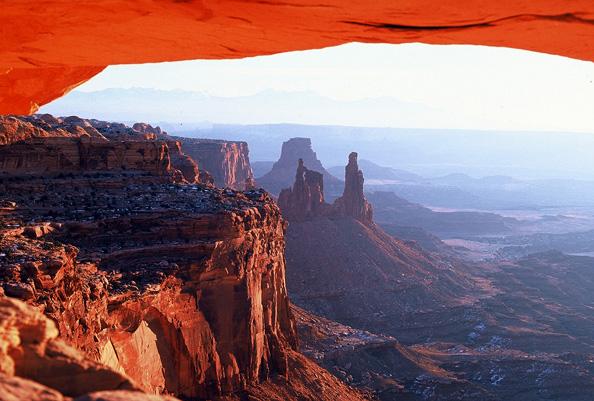Barron: Utahns Must Demand Conservation over Recreation

A view from Canyonlands National Park (Courtesy Wikimedia Commons)
October 26, 2019
The Yellowstone Act of 1872 established our country’s first national park, dedicating Yellowstone and all future parks to be “for the benefit and enjoyment of the people.” It also tasked the Secretary of the Interior with the duty to make “rules and regulations… necessary or proper for the care and management” of the park.
In practice, these “rules and regulations” look like the National Park Service (NPS) “don’t bust the crust” campaign to ensure that the Arches and Canyonlands parks remain pristine and ecologically sound for future generations to enjoy. Sadly, it is clear that some within NPS leadership have chosen to neglect their conservation and preservation responsibilities and allow the devastation of the land in their care.
This devastation can be most recently seen in the decisions of Acting Intermountain Regional Director of the NPS, Palmer “Chip” Jenkins. Director Jenkins issued a memo forcing Utah’s five national parks to comply with Utah state road-access law, which allows off-road vehicles (ORVs) like ATVs into the Mighty Five. S.B. 181 authorizes any “street-legal” vehicle to drive on all state and county roads.
Since the law’s passage in 2008, the NPS has argued that even legal ORVs would increase illegal off-roading, as there are not enough park personnel to enforce off-roading laws. According to Phil Francis, a previous park superintendent, the idea that NPS policies must be consistent with state law does not take into account the country-wide significance of national parks. Bending to the states may prevent the NPS from fulfilling the responsibilities laid out by the U.S. Congress, as clearly seen in Jenkins’s memo.
Jenkins made the decision to open the Mighty Five to ORVs without asking for public input. This means the only opinions on this issue he heard were from Utah’s off-roading groups that petitioned Interior Secretary David Bernhardt for access in July. These off-roading groups argued that concerns about the impact of these vehicles on the park were unfounded; however, the U.S. Forest Service released a comprehensive study of the effect of ATV traffic on land in 2008, which found that natural resources are absolutely affected by ORV traffic. These vehicles contribute to expanding trail widths and the loss of original ground cover.
While Jenkins may not have asked for input on his decision, Superintendent of Arches and Canyonland National Parks Katie Cannon wrote a memo detailing how ORVs would harm her park. Cannon expects ORVs to degrade the parks’ air quality and increase noise pollution — disturbing both the visitors and the wildlife. Utahns should follow Cannon’s lead and email Jenkins directly to demand that he complete a thorough and impartial analysis of the potential impacts of ORVs on Utah’s parks prior to opening the parks. Utahns should also write their state legislators to remind them that the Yellowstone Act of 1872 supersedes this state law and to ask them to ensure protection for our national parks from ORVs.
This seemingly simple decision will endanger the unique landscapes of the parks, damaging the environment and lowering the quality of visitor experiences. Allowing ORVs into the Mighty Five will benefit very few visitors at the expense of many others. ORVs will cause problems in our parks like increases in erosion, off-roading and noise pollution. If Utahns want to continue to identify ourselves and our state by the beautiful, natural formation in our national parks like the Delicate Arch, we need to stand up for the Mighty Five by demanding NPS leadership prioritize conservation instead of recreation.
NPS Management Policies reads, “When proposed park uses and the protection of park resources and values come into conflict, the protection of resources and values must be predominant.” By siding with recreation over conservation, Jenkins is failing to uphold the National Parks’ charter. While the consequences of this neglect will impact all Americans, Utahns have a duty to address this action, as it is our state law that has opened these parks to danger in the first place.








Keith kalmar • Feb 16, 2020 at 11:12 pm
This has nothing to do with conversation it has everything to do with a private sactuary for a certain kind of people hikers and pedal bikers but for people who don’t do those things well sorry you don’t get to see the park’s fabulous sights just cause a little dust and noise who are you to decide who and how we see these sights the roads are there and we know as well as you do how too stay on a trail and contrary to what you think we know we have to take care of these parks so my children will be to get in there oh v and see the same wonderful sights as I did everybody knows about conservation the real problem here is in your infinite wisdom you’ve decided that some dust and noise is too much for your sactuary discriminating how people see these parks is unfair not right we all know these parks are American treasures that have to be preserved but we all have a right to see them the way we want to and not you or anyone else should have the right to tell us no ohv are not the problem private sactuary and a certain kind of people are the real problem